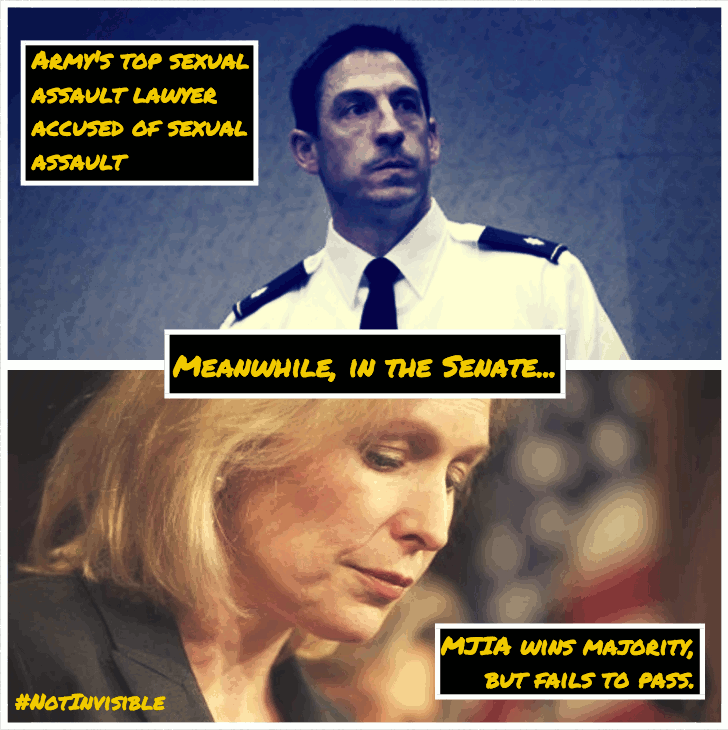
(SNN) - Senator Gillibrand's military sexual assault bill entitled the Military Justice Improvement Act (#MJIA), supported by a majority of survivors of Military Sexual Trauma (#MST), was blocked procedurally yesterday in a 55 Ayes-45 Nays vote, just 5 short of the number of Ayes needed to pass it.
Sen. McCaskill's military sexual assault bill, supported by military commanders and some survivors, was voted on immediately following the vote on Sen. Gillibrand's bill and passed unanimously, as supporters of Gillibrand's bill threw all their support to passing McCaskill's bill following the blocking of Gillibrand's bill.
Clearly Gillibrand's supporters felt that McCaskill's bill is better than nothing.
You can read about why Gillibrand's bill is important to female and male survivors here. In addition, many survivors complain that their rapists are often members of their own chain of command, making it more difficult to expect justice from commanders, even with the reforms McCaskill's bill would enact. Commanders, on the other hand, do not want to give up any power. Most agree the military culture of misogyny makes MST more likely to occur. The question is, have military commanders finally developed the will to make the changes necessary to actually impact this problem. Many survivors don't think they have. And who could blame them, given the military's long and shameful track record with this issue.
MST encompasses trauma inflicted due to rape, sexual assault (physical touching of a sexual nature), and sexual harassment (unwelcome sexual advances, requests for sexual favors, and other verbal or physical conduct of a sexual nature that tends to create a hostile or offensive work environment). By definition sexual harassment is part of sexual discrimination, especially when it is pervasive in an organization, career field, or society and designed to make members of one gender feel uncomfortable and/or unwanted, to render them ineffective, or to block their access to specific jobs or to upward mobility within an organization.
According to Wikipedia, "Misogyny is the hatred or dislike of women or girls. Misogyny can be manifested in numerous ways, including sexual discrimination, denigration of women, violence against women, and sexual objectification of women."
Survivors of MST are victims of sexual crimes who were not also murdered, or who did not successfully commit suicide as a consequence of MST. There are a number of non-survivors, Pfc. LaVena Johnson and Carri Goodwin are two.
MST in the form of rape and sexual assault is experienced by approximately one-third of female military members, and most often their perpetrators are male military members. Fully one-half of the total numbers of MST survivors are male and their perpetrators are most often heterosexual male military members. Male survivors constitute approximately 1-5% of all males in the military. Against males, rape and sexual assault has been used as a disciplinary tool as well as a method of denigrating them as "females" by treating them in the most debase manner conceivable. Only a very small percentage of all reported cases of rape within the military are ever prosecuted and punished.
Serial rapists who leave the military, most with Honorable Discharges and full veterans benefits, move into civilian neighborhoods and organizations where they continue to commit sex crimes. Do I need to remind you that rape, sexual assault, and sexual harassment is not about sex? It is about power and control.
Lest you think this is a recent phenomenon, rape of military males and females by other military members has been documented at least as far back as World War II. This doesn't include rape of non-military personnel, civilian dependents, and other civilians--also historically a serious problem the military has mostly swept under the proverbial rug.
Given the controversy surrounding these bills, and the drama played out yesterday in the senate, three things are very apparent to me: One, the military's love affair with misogyny, discrimination, and MST aren't going to go away any time soon; two, both senators and their supporters strongly believe their bill is the best way to help prevent future MST among military members and are therefore to be commended for their efforts to help survivors; three, Gillibrand's proposed solution will likely reappear on the Senate docket since survivors still believe her solution is the only way to create real positive change for survivors still in the military and for future military members. Indeed, many survivors expressed feelings of betrayal over yesterday’s vote, and a lack of confidence in McCaskill’s reforms.
No MST survivor fighting for this bill will ever be helped by any changes made in the military. There is a strong sense of survivors being motivated by honor and duty and an abiding belief in never leaving a comrade behind.
As one survivor put it, "This is just a little bug, it's not over yet."
Image by: Maye Ralston, All Rights Reserved.
More Opinion News
-
Cork and the Geez Talk Oscars
Monday, February 27, 2017
The Old Coot & the Geezer analyze what went wrong and what went right at the Academy Awards this year, review the show, and recommend who should host next year. The duo are America's most respected fuddy-duddy film ...
-
Cork and the Geez Dish on the Golden Globes
Tuesday, January 24, 2017
(SNN) The Old Coot and the Geezer, affected no doubt by the rainy weather in Southern California turn grumpy as they analyze the Golden Globes and show what they mean--mostly good food for the media. Will Hollywood ...
-
Revisiting "Two-a-Days" with One Small Difference
Thursday, October 06, 2016
(SNN) For four years of high school and one in college, I would spend a couple of weeks during the dog days of August involved in what was known as "Two-a-days." Those, as any current or former football player ...
-
Coping with the Wobblies
Sunday, September 18, 2016
(SNN) Belonging to an elite group is only fun if it was one you aspired to, like giving a hundred speeches and becoming a Distinguished Toastmaster. During that time I would get the “wobblies” almost weekly. “What’s ...
-
Experimental Turkeys & Murphy's Law
Friday, September 16, 2016
(SNN) It is a paradox of science that before any breakthrough there is often a f’ed-up earlier stage. Out of this f’ed-stage have come some turkeys – turkeys that crossed the road to find something of value on the ...
-
Adventures in Eating
Sunday, August 21, 2016
(SNN) Some food combinations reside in the collective unconscious – and then there are those that shouldn’t exist at all. That special is a lottery. Visible from my apartment is a restaurant that has been struggling ...
-
No More Miscarriage Taboo
Friday, June 24, 2016
(SNN) I got a tattoo recently to honor the life and death of my daughter. The potential of her. The possibility of her. The scarred grief of her that tore up my heart. The fact that she was not born alive did not ...
-
Since the Pulse Stopped
Tuesday, June 21, 2016
Since 'the Pulse stopped,' I've been thinking a few things. (SNN) The other day 49 human beings were murdered, and 53 more were injured in an attempt to murder them, simply for being in a "Gay" nightclub called ...
-
Fall Down, Go Boom
Tuesday, March 22, 2016
(SNN) My doctor has asked me to not fall down. I’ve attempted to honor his request, but it's easier said than done. Staying upright cannot be taken for granted if, like me, you own a fused ankle, Silly Putty knee ...
-
Character Actors: Not Just In It to Win It
Friday, January 29, 2016
(SNN) The death this week of actor Abe Vigoda at 94 reminds us that there are degrees of success of Hollywood, that fame can come after thirty years of toiling in obscurity, and that a great actor is a great actor ...

